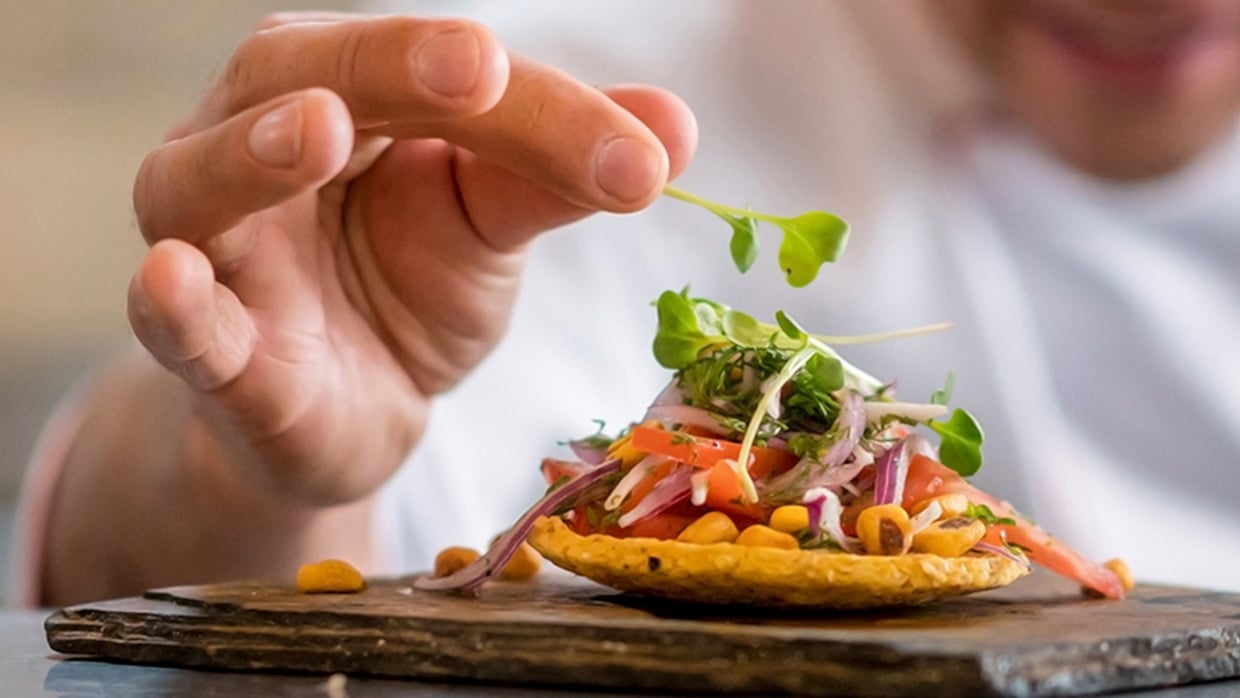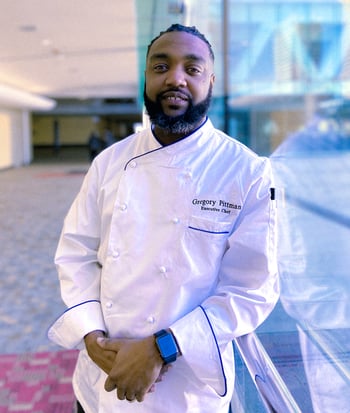Meet the Chefs of Sodexo Live!: Chef Gregory Pittman

Chef Gregory Pittman wears many hats in his role as executive chef at the Baltimore Convention Center. But running a large operation is all in a day’s work for the talented chef, whose passion for food shines through in his innovative menus. We caught up with Chef Pittman, who has been with Sodexo Live! since 2019, to chat about food inspiration and what people are really craving these days.

Interviewer: How did you become interested in the culinary arts?
Chef Gregory Pittman: It goes back to my childhood. My mom and stepdad owned restaurants. We traveled around and I was always helping out in the kitchen. I remember being 7 years old, roasting potatoes, learning from the cooks. I was always working in the kitchens, and this is where I learned most of my passion for cooking. I went on to pursue my culinary career by going to L’Ecole Culinaire in Memphis, Tennessee. I’ve worked in multiple restaurants for some prestigious chefs in Memphis, then to the Peabody Hotel and as the executive chef for one of the largest hospitals in Memphis. I was also the hotel and restaurant manager chef for Crowne Plaza. I've been in the culinary field now as an executive chef for about 12 years.
Interviewer: How is running a convention center different from your other roles in the past
Chef Gregory Pittman: This is totally different. You take some of my past experience and you see restaurant chef, you see hotel chef, you see health care chef, you also see colleges and universities — I was also a college and university chef in Chicago. But sports and leisure really opened the doors for innovation, creativity and being open to feeding large groups.
Interviewer: What is your philosophy when it comes to creating menus?
Chef Gregory Pittman: You have to do your research and you have to know the demographics and be educated about the shows at the convention center. And you have to know what the client wants. Sometimes the client may want certain things that they're not able to really vocalize, but it's up to you as the chef to be able to give them the image, produce it through food and create the experience for them. So when I write menus, I take these into consideration — where people are coming from, the demographic, the ratios of men to women, what type of event it is. And I also want to try to showcase a little bit of myself through personalization, being able to reach people through food to where they actually feel they know the chefs, they know the retail workers who are at the stands providing good customer service. Because food is not always about the first bite. Food is about anticipation; food is about the thought of, “Hey, I'm about to go and grab something to eat. I smell these onions and garlic cooking.” Food is always an experience, so when I write menus, that's my motivation behind that.
Interviewer: With the variety of shows that come to the convention center, you must do a lot of research.
Chef Gregory Pittman: You have to plan ahead and definitely see the future and reimagine what full service could be. I'm not one who says, “Hey, let's hurry up and get back to normal.” I don't think normal is the direction to go, but rather reimagining things and being innovative. What time do you have other than now to really put things a step ahead? Families have been at home preparing meals for themselves for almost two years now. So when we're writing menus, we have to take that knowledge and expand on it.
Interviewer: What's the largest number of people you've served at the convention center?
Chef Gregory Pittman: The largest number I've cooked for was about 3,000 on a plated meal. We do buffets up to 3,500. I've traveled around in other locations to help and support, where I was able to gain that experience working with those groups. In my current location, we have one coming up that’s for 1,000 people.
Interviewer: What types of food are people asking for these days?
Chef Gregory Pittman: I'm a Southern guy, and people want comfort food. Soul food, comfort food, hearty meals — but elevated, using a much more dietary cooking method, so maybe grilling instead of frying. Comfort food is definitely a place where people typically go back to in times of uncertainty. You can relate it back to, again, personalization: This is how I actually coach my team — think about personalization and how you can connect things. Think about when you’re cooking — in my household, for example, it’s a sweet potato pie. My grandmother made an amazing sweet potato pie. When I felt that I needed to go home, all I had to do was think about the sweet potato pie, and I felt that I was home. So comfort food relates to home and in a time of uncertainty. That's where people feel the most safe.
Interviewer: Other than family, where else do you find food inspiration?
Chef Gregory Pittman: I get inspiration from the smallest things! My dishwasher would come in and say, “Hey, Chef, you mind if I throw something on for lunch?” and he bangs out a chicken curry. My human resource manager comes in and says, “Hey, Chef, I want to make a goat curry.” She's from the islands and people just want to showcase what they're used to. So it's not necessarily just family, right? If you're around me for a while and want to key in on a few things that you like, I'll probably be able to build a nice menu of things that I think you will enjoy. Inspiration is not just food-based, it's also personality-based.